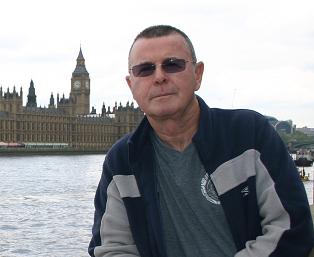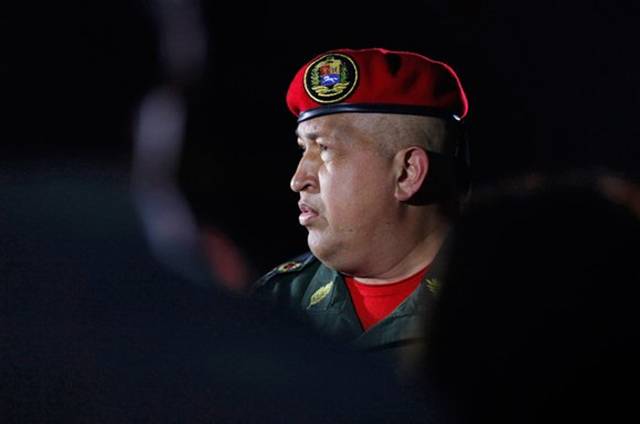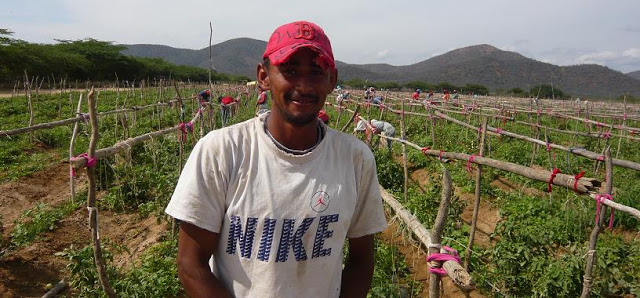Venezuela After Chávez
Nilantha Ilangamuwa Interviews Patrick O’Donoghue

Many times over the years Chavez complained that he had to act as the mayor of Venezuela and not as president, in other words, officials were not doing their job and all the complaints were coming to him and he had to solve them.
What will happen to Venezuela after an uncertain death of the President Hugo Chavez? Here is with me, Patrick O’Donoghue to discuss present political trends in the country. He is former news editor of VHeadline.com and London correspondent for Las Verdades de Miguel (Venezuelan) weekly newspaper based Caracas .
Q. President Hugo Chavez has just died, what is current political situation in the Country?
 A. This evening Vice President Nicolas Maduro will be sworn in as President of the Republic. According to the Constitution, once that happens, the president of the National Assembly has the duty to call elections to take place in 30 days time. The president of the National Assembly is Disodado Cabello, a key personality within the ruling United Socialist Party of Venezuela (PSUV). Cabello, Maduro and state oil company, Petroleos de Venezuela (PSUV) president, Rafael Ramirez have promised to respect the wishes that President Chavez made before he went to Cuba for the final operation in December, and true to his military training, Chavez planned strategy and tactics for the future.
A. This evening Vice President Nicolas Maduro will be sworn in as President of the Republic. According to the Constitution, once that happens, the president of the National Assembly has the duty to call elections to take place in 30 days time. The president of the National Assembly is Disodado Cabello, a key personality within the ruling United Socialist Party of Venezuela (PSUV). Cabello, Maduro and state oil company, Petroleos de Venezuela (PSUV) president, Rafael Ramirez have promised to respect the wishes that President Chavez made before he went to Cuba for the final operation in December, and true to his military training, Chavez planned strategy and tactics for the future.
One of the main tactical decisions was to secure that Nicholas Maduro would be the party’s candidate in any future election, making the Homeland Plan 2013-2019 the main strategy. Cabello, as a former military man and participant in Chavez’ 1992 failed military rising, has been the main contact between Chavez and the military, a role he will continue to play no doubt in the transition and crucial times ahead.
Another “historical task” that the President insisted upon before the operation was the quest to end poverty in Venezuela ; Ramirez will continue to ensure that oil revenue will fund flagship social programs. It is not certain how the opposition will react and it seems most likely that they will continue to try and exploit weaknesses to gain political points. Politically, they have little choice than to make Henrique Capriles Radonski their candidate again against Maduro, despite his losing the presidential race against Chavez last December.
Q. According to the Constitution of the Venezuela, the government must go for a fresh election. Many political commentators were commenting on forthcoming election and noted that will be a very crucial election. Perhaps it will be a huge challenge to the Vice President Nicolas. I would like to have your take?
A. According to the majority of commentators, Maduro is likely to win the election, given the huge popularity and sentiment of the poorer classes towards Chavez as can be seen during the death and mourning period. However, the opposition will probably try to exploit the secrecy surrounding the President’s post-operation health after the operation and when he arrived back in Venezuela .
The PSUV is also preparing for elections that had been scheduled in a few months time for mayoralties throughout Venezuela . They easily won state governorship elections also held last December, losing only three governorships. Given the fact that government supporters will adhere strictly to President Chavez’ wishes, it is unlikely that Maduro will have any problems from within the PSUV and the wider Patriotic Pole of Chavez supporters, which includes the Communist Party of Venezuela (PCV).
Q. Some of well reputed authors claimed that this unfortunate death of the President Chavez is a plot which might be accomplished or conducted by the foreign intelligence agency. Meanwhile, according to Media, Vice President Nicolas himself claimed that, his cancer was a result of an attack by enemies”. What do you think about this and let us know more details on the role of the Foreign Spy agencies in the region?
A. A day before President Chavez died, Vice President Maduro ordered two US military attaches to leave the country within 24 hours for allegedly attempting to contact Venezuelan military officers. The US has no ambassador in Caracas , nor has Venezuelan Ambassador in Washington . The US has ridiculed the accusation that its intelligence agencies caused the death of Chavez through inducing cancer, but within Venezuela and government sectors, the suspicion remains because of the history of the US “dirty tricks,” or “black bag” activities in the region. I think people in Venezuela and South America are keeping an open mind on this.
The phrase “I wouldn’t put it past them,” would be a common sentiment. Both the Americans and Israelis have intelligence operations in Venezuela , the latter because of President Chavez’ alignment with many Arab countries and Iran . The Colombians and Brazilians have always had an intelligence presence operational, especially Colombia which has close relations with the US and the United Kingdom and a badlands border area. Cuba has been key in providing training for Venezuelan counter-intelligence and security agencies. When President Chavez came to power and during the first years in office, Venezuela ‘s security agencies had been heavily infiltrated principally by US, Israel and anti-Cuban agencies based in Miami . We must remember that before Chavez , Venezuela was considered part of the USA ‘s backyard and a main supplier of oil.
Q. Meanwhile, some of mainstream rights groups claim that the Chavez Regime is based on Authoritarianism. What is your take on his (President’s Chavez) political ideology and the system of governance?
A. This is one of the most difficult or grey areas during the Chavez period because it involves the move from one system to an entirely new one. A transition that can never be seamless and without controversy. From representational to participatory democracy. All of the institutions in Venezuela were turned upside down by the arrival of Chavez and the Bolivarian revolution (based on the ideas of the Liberator Simon Bolivar who led the independence struggle against Spain in the 19th century covering five Latin American countries). The basic idea that challenged all of Venezuela ‘s institutions and the rule of law was their relevance to the poorer sectors Venezuela .
That was the measuring rod and many of the institutions were found at fault. The same could be said of the traditional human rights groups which discovered that under Chavez many of their functions were being assumed by the state. Hence, the rise of partisan HR groups or NGOs funded by the opposition. It could be argued that many of the people Chavez chose as ministers or who were appointed, according to the Constitution, to run institutions were not up to the task.
Many times over the years Chavez complained that he had to act as the mayor of Venezuela and not as president, in other words, officials were not doing their job and all the complaints were coming to him and he had to solve them. For me, that gave rise to some of the accusations that he was authoritarian. Underlying the President’s forcefulness and impatience at times, was his promise to make things better for the ordinary people of Venezuela .
As regards freedom of expression and the rule of law, it is a well-known fact that people could and can express what they thought and often did so, especially in the mass media in the hands of the oligarchy. While the government avoided as far as possible any closures, they were able to curtail what I would call OTT destabilisation strategies employed by media barons such as such as Marciel Granier of RCTV by legally refusing to renew air wave licenses. Another fact to consider is that the Bolivarian process also questioned the role of international human rights organisations, especially those belonging to what is now a highly-questioned (not just in Venezuela ) Organisation of American States (OAS). As a result, one of the international successes of Chavez was the creation of the Community of Latin American and Caribbean States (CELAC), which is an organisation of Latin America and Caribbean countries without the USA and Canada .
|
Agricultural Revolution during first term of the Chavez Government – Photo by Patrick O’Donoghu |
Q. After Chavez, possible nightmare or political disaster in the Country, was a general comment that rose by some of mainstream medias. I would like to have your take on the future of Venezuela ?
A. Many of the commentaries, coming from the United Kingdom and USA suggest that the Venezuelan economy is in dire straits and that sooner or later the country will face disaster. The Financial Times spearheads predictions of economic doom looking at it from a capitalist point of view. The government has been weak in answering these charges, in my view, given that the majority of foreign newspapers and media sources reflect the FT and Bloomberg point of view, ignoring the domestic growth rate, return of gold bullion, lower inflation rate, international reserves and foreign debt payments. No doubt, one of the biggest challenges facing the new government of Maduro, once elected, will be to ensure food security and the success of the agricultural policy;
President Chavez put a huge amount of money and assets into the program. Part of the struggle over the last 14 years has been to curtail sabotage on the part of the private sector that had been subsidised and pampered by former governments. In fact, it is important to point out that the private sector was unable to compete in the early 90s era of globalisation for example, when it became cheaper to import yellow cheese from Uruguay than to buy domestic products.
The new government will also have end to some of the improvisation that was characteristic under Chavez and continue to fight corruption. It will also have to rely on and consolidate people power to ensure that the groundwork laid by Chavez since 2003 continues. That will mean continuing to monitor and curtail sabotage on the part of opposition sectors and of course, meddling by foreign intelligence agencies. Venezuela has a democratic tradition and in the short term, it is unlikely that there will be any major upheaval, even though some commentators are looking at what happened in nearby Grenada under Maurice Bishop.
The high crime rate is another serious challenge that the new government will face and it will have to continue to purge the thoroughly corrupt police forces and boost the new police services started to create public trust. The inability to solve this problem has allowed the opposition to score brownie points among the electorate.
As for foreign policy, the question is whether it is time for change. Nicolas Maduro had been Foreign Minister for the last five to six years. Under the new minister, Elias Jaua, it is possible that there could be a review, especially towards countries, such as Sri Lanka . There was unease – and I include myself – about the Chavez government’s too easy acceptance of the Sri Lankan President’s version of the civil war in the north of that country and the attempt several years ago to prevent Tamil groups from getting their view across to the Venezuelan government by the Sri Lankan ambassador to Cuba, herself a Tamil.
Nilantha Ilangamuwa is journalist and editor of the Sri Lanka Guardian, an online daily news paper based in Colombo Sri Lanka. He can be reached at [email protected] or [email protected]



